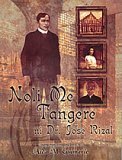You need to sign in or sign up before continuing.
Take a photo of a barcode or cover
183 reviews for:
Noli me tangere ni Dr. José Rizal : isang masusing pag-aaral
Aida M. Guimarie, José Rizal
183 reviews for:
Noli me tangere ni Dr. José Rizal : isang masusing pag-aaral
Aida M. Guimarie, José Rizal
challenging
emotional
informative
medium-paced
Plot or Character Driven:
A mix
Strong character development:
Yes
Loveable characters:
Complicated
Diverse cast of characters:
Yes
Flaws of characters a main focus:
Yes
I was a bit daunted by this book at first but I'm really glad I picked it up. I didn't know anything about the history of the Philippines before picking up Noli Me Tangere, and while it gives a broad overview of society through the many characters in the book, and their conflicting views and motives, it was very readable and easy to keep track of the characters and their actions. Rizal really goes off on the Catholic church, and reading about his life and the response to the book was also very interesting.
Moderate: Violence
challenging
emotional
sad
medium-paced
Plot or Character Driven:
A mix
Strong character development:
Yes
Loveable characters:
Yes
Diverse cast of characters:
Yes
Flaws of characters a main focus:
No
challenging
dark
emotional
informative
inspiring
reflective
sad
tense
slow-paced
Plot or Character Driven:
A mix
Strong character development:
Yes
Loveable characters:
Yes
Diverse cast of characters:
Yes
Flaws of characters a main focus:
No
After his studies in Europe, Crisóstomo Ibarra returns to the Philippines and meets the town's parish priest at a party. While Crisóstomo has grand ideas for the future of his country, he experiences hostilities and pushback from the Catholic Church. What ensues is a struggle between Asian resistance and European colonialism.
TÁNGERE, translated from Spanish into English, is a literary journey that took me through the intricacies of Philippine society under Spanish occupation. The translation is surprisingly modern despite its historical context and provides a vivid portrayal of the challenges faced by each character.
TÁNGERE delves deep into theology and Catholic Church structures, which left me perplexed since I don't know much about Christianity. A quick Google search helped me understand the significance of the Christianity-related elements, but it might be a stumbling block for readers unfamiliar with the cultural and historical context.
What makes TÁNGERE epic is its role in inspiring Philippine independence. The narrative, however, tends to meander into tangents, making it challenging to follow the main story. Personally, I found myself consulting the Wikipedia plot summary for clarification as I progressed through each chapter, ensuring a more comprehensive understanding.
Regardless of its stylistic shortcomings, TÁNGERE paints a vivid picture of the horror and injustices endured under the Spanish occupation, with a critical eye on the Church's role in exacerbating rather than alleviating the suffering of the people. The last 10% of the book is where the story truly grips me, offering relevance that extends beyond its historical setting and into contemporary issues.
Despite the initial challenges, I am grateful for the opportunity to read this Asian classic, as it provides valuable insights into the Philippines' history and the fight for independence. I'm so excited for the next Asian classics group read and the chance to explore more literary gems that broaden my understanding of different Asian cultures and histories.
TÁNGERE, translated from Spanish into English, is a literary journey that took me through the intricacies of Philippine society under Spanish occupation. The translation is surprisingly modern despite its historical context and provides a vivid portrayal of the challenges faced by each character.
TÁNGERE delves deep into theology and Catholic Church structures, which left me perplexed since I don't know much about Christianity. A quick Google search helped me understand the significance of the Christianity-related elements, but it might be a stumbling block for readers unfamiliar with the cultural and historical context.
What makes TÁNGERE epic is its role in inspiring Philippine independence. The narrative, however, tends to meander into tangents, making it challenging to follow the main story. Personally, I found myself consulting the Wikipedia plot summary for clarification as I progressed through each chapter, ensuring a more comprehensive understanding.
Regardless of its stylistic shortcomings, TÁNGERE paints a vivid picture of the horror and injustices endured under the Spanish occupation, with a critical eye on the Church's role in exacerbating rather than alleviating the suffering of the people. The last 10% of the book is where the story truly grips me, offering relevance that extends beyond its historical setting and into contemporary issues.
Despite the initial challenges, I am grateful for the opportunity to read this Asian classic, as it provides valuable insights into the Philippines' history and the fight for independence. I'm so excited for the next Asian classics group read and the chance to explore more literary gems that broaden my understanding of different Asian cultures and histories.
As a Filipino-American, I feel terrible for not giving this classic a higher rating, but I did not like the dragging plot, overwrought prose, or self-conscious descriptions of Filipino culture. Only some of the secondary characters (Elias, Tasio, Dona Victorina) kept me engaged during long trips by car and plane.
Ito ay isang librong mahalaga sa kasaysayan at kultura ng aking bansa, kaya isusulat ko ang aking mga pananaw sa librong ito gamit ang pambansang wika. Isa itong paraan upang ipakita ang aking pagpapahalaga sa aking kalayaan.
Ang akdang ito ay sumasalamin sa mga pagsubok at hirap na pinagdaanan ng mga Pilipino sa kamay ng mga Espanyol. Mula sa diskriminasyon, kawalan ng hustisya, karahasan, at pang-aabuso ng mga tao na nasa matataas na posisyon sa kanilang kapangyarihan, makikita ng mambabasa ang lahat ng mga panig at karanasan ng iba’t-ibang tao.
Makikita nila na kahit ang mga taong dapat ay mang-aalaga at magbibigay direksyon sa isang komunidad ay maaaring maging abusado, hangal, at ‘di makatotohanan.
Marami pa akong nais na sabihin, ngunit ako’y nababahala na baka ako’y makapagbigay pa ng mga “spoiler”
Kahit lagpas isang daang taon na ang lumipas mula sa pagkalimbag ng librong ito, marami sa mga tema nito ay maaaring makita sa ating lipunan ngayon. Marami pa din tayong matututunan mula sa mga pinagdaanan ng mga tauhan sa akda, lalo na sa kasalukuyang panahon.
Kaya mambabasa, kung nasa ika-siyam o ika-sampung baitang ka, subukan mong basahin ito. Oo medyo malalim yung Tagalog pero ok lang ‘yon. May Google translate naman:) Nosebleed ang aabutin mo dito pero may halaga naman ang pagdadaanan mo!
Paalam at Good Luck!
Ang akdang ito ay sumasalamin sa mga pagsubok at hirap na pinagdaanan ng mga Pilipino sa kamay ng mga Espanyol. Mula sa diskriminasyon, kawalan ng hustisya, karahasan, at pang-aabuso ng mga tao na nasa matataas na posisyon sa kanilang kapangyarihan, makikita ng mambabasa ang lahat ng mga panig at karanasan ng iba’t-ibang tao.
Makikita nila na kahit ang mga taong dapat ay mang-aalaga at magbibigay direksyon sa isang komunidad ay maaaring maging abusado, hangal, at ‘di makatotohanan.
Marami pa akong nais na sabihin, ngunit ako’y nababahala na baka ako’y makapagbigay pa ng mga “spoiler”
Kahit lagpas isang daang taon na ang lumipas mula sa pagkalimbag ng librong ito, marami sa mga tema nito ay maaaring makita sa ating lipunan ngayon. Marami pa din tayong matututunan mula sa mga pinagdaanan ng mga tauhan sa akda, lalo na sa kasalukuyang panahon.
Kaya mambabasa, kung nasa ika-siyam o ika-sampung baitang ka, subukan mong basahin ito. Oo medyo malalim yung Tagalog pero ok lang ‘yon. May Google translate naman:) Nosebleed ang aabutin mo dito pero may halaga naman ang pagdadaanan mo!
Paalam at Good Luck!
dark
informative
sad
slow-paced
Plot or Character Driven:
A mix
Strong character development:
No
Loveable characters:
No
Diverse cast of characters:
No
Flaws of characters a main focus:
Yes
Noli Me Tangere is interesting as a historical fiction novel, especially wrt the history it's author created by writing it. As a novel it's unfocused, in need of a serious re-edit and frankly not terribly exciting. It took me so long to finish and I never gave up, but I was considering doing so several time. In pure literary terms, I'm not sure I'd recommend it to a friend.
emotional
reflective
sad
slow-paced
Plot or Character Driven:
Plot
Strong character development:
Complicated
Loveable characters:
Complicated
Diverse cast of characters:
Yes
Flaws of characters a main focus:
Yes
Graphic: Bullying, Child abuse, Death, Emotional abuse, Mental illness, Physical abuse, Racial slurs, Racism, Torture, Violence, Blood, Death of parent, Murder, Colonisation, Classism
The story and characters are as plain as could be expected from a novel based on true events. Interestingly, the most interesting part was the translator's (a Brit) introduction. Here are some excerpts from it:
That last part shows clearly how atrocious the Spanish were to the local Filipinos. And what's the lesson many Filipinos learned, and still practice today? Hate Muslims (in the South of the Philippines, but also everywhere), and blame them for everything! They were among the last few to fight against the Spanish, and subsequently the American, invasion, but they are hated by their compatriots. This is truly sad.
Here are some excerpts from the novel proper:
Lessons taken: Filipinos endured a lot from the Spanish (forced Christianization of most Muslim Filipinos, torture, mockery, disrepect, and of course tyrannical robbery), and for that they have my full sympathy. Unfortunately, though, the Filipinos of today hate Muslims (e.g. in Sulu and South Mindanao) and call them terrorists/pirates/separatists, although the real criminals are still enjoying the wealth they've made through Filipino suffering, including the Filipino government (in it current/modern from). It has to be said that there have been many crimes against civilians committed by Muslims in the south, and as a Muslim, I denounce them, but I also denounce all crimes against Muslims.
Only on occasions when some stubborn resistance was met with, as in Manila and the surrounding country, where the most advanced of the native peoples dwelt and where some of the forms and beliefs of Islam had been established, was it necessary to resort to violence to destroy the native leaders and replace them with the missionary fathers.
...
The system of government was, in its essential features, a simple one. The missionary priests drew the inhabitants of the towns and villages about themselves or formed new settlements, and with profuse use of symbol and symbolism taught the people the Faith, laying particular stress upon “the fear of God,” as administered by them, reconciling the people to their subjection by inculcating the Christian virtues of patience and humility. When any recalcitrants refused to accept the new order, or later showed an inclination to break away from it, the military forces, acting usually under secret directions from the padre, made raids in the disaffected parts with all the unpitying atrocity the Spanish soldiery were ever capable of displaying in their dealings with a weaker people. After sufficient punishment had been inflicted and a wholesome fear inspired, the padre very opportunely interfered in the natives’ behalf, by which means they were convinced that peace and security lay in submission to the authorities, especially to the curate of their town or district.
...
Thus it stands out in bold relief as a system built up and maintained by fraud and force, bound in the course of nature to last only as long as the deception could be carried on and the repressive force kept up to sufficient strength. Its maintenance required that the different sections be isolated from each other so that there could be no growth toward a common understanding and coöperation, and its permanence depended upon keeping the people ignorant and contented with their lot, held under strict control by religious and political fear.
...
Thus the struggle went on, with stagnation above and some growth below, so that the governors were ever getting further away from the governed, and for such a movement there is in the course of nature but one inevitable result, especially when outside influences are actively at work penetrating the social system and making for better things. Among these influences four cumulative ones may be noted: the spread of journalism, the introduction of steamships into the Philippines, the return of the Jesuits, and the opening of the Suez Canal.
...
They undertook to hold the native in subjection, to regulate the essential activities of his life according to their ideas, so upon them must fall the responsibility for the conditions finally attained: to destroy the freedom of the subject and then attempt to blame him for his conduct is a paradox into which the learned men often fell, perhaps inadvertently through their deductive logic. They endeavored to shape the lives of their Malay wards not only in this existence but also in the next. Their vows were poverty, chastity, and obedience.
...
add also the ever-present jealousies, petty feuds, and racial hatreds, for which Manila and the Philippines, with their medley of creeds and races, offer such a fertile field, all fostered by the governing class for the maintenance of the old Machiavelian principle of “divide and rule,” and the sum is about the most miserable condition under which any portion of mankind ever tried to fulfill nature’s inexorable laws of growth.
...
Just where will come the outbreak after three centuries of mind-repression and soul-distortion, of forcing a growing subject into the strait-jacket of medieval thought and action, of natural selection reversed by the constant elimination of native initiative and leadership, is indeed a curious study. That there will be an outbreak somewhere is as certain as that the plant will grow toward the light, even under the most unfavorable conditions, for man’s nature is but the resultant of eternal forces that ceaselessly and irresistibly interplay about and upon him, and somewhere this resultant will express itself in thought or deed.
...
It was one of those magic December mornings of the tropics—the very nuptials of earth and sky, when great Nature seems to fling herself incontinently into creation, wrapping the world in a brooding calm of light and color, that Spain chose for committing political suicide in the Philippines.
...
The troops filed past the [the author, Rizal's] body, for the most part silently, while desultory cries of “Viva España!” from among the “patriotic” Filipino volunteers were summarily hushed by a Spanish artillery-officer’s stern rebuke: “Silence, you rabble!”
That last part shows clearly how atrocious the Spanish were to the local Filipinos. And what's the lesson many Filipinos learned, and still practice today? Hate Muslims (in the South of the Philippines, but also everywhere), and blame them for everything! They were among the last few to fight against the Spanish, and subsequently the American, invasion, but they are hated by their compatriots. This is truly sad.
Here are some excerpts from the novel proper:
Our nature is to love sweetness and tenderness in woman, and we would shudder at the thought of taking the blood-stained hand of a maiden, even when the blood was that of a Moro or a giant, so abhorred by us.
...
Let us not ask for miracles, let us not ask that he who comes as an outsider to make his fortune and go away afterwards should interest himself in the welfare of the country. What matters to him the gratitude or the curses of a people whom he does not know, in a country where he has no associations, where he has no affections?
...
His heart had never been capable of entertaining hate nor had he been able to find a single filibuster; he saw only unhappy wretches whom he must despoil if he did not wish to be more unhappy than they were. When he was threatened with prosecution for passing himself off as a physician he was not resentful nor did he complain. Recognizing the justness of the charge against him, he merely answered, “But it’s necessary to live!”
...
In her geography Doña Victorina divided the world into the Philippines and Spain; rather differently from the clever people who divide it into Spain and America or China for another name.
...
“For what, then, are the priests who proclaim their mission of peace and charity? Is it more meritorious to moisten the head of a child with water, to give it salt to eat, than to awake in the benighted conscience of a criminal that spark which God has granted to every man to light him to his welfare? Is it more humane to accompany a criminal to the scaffold than to lead him along the difficult path from vice to virtue? Don’t they also pay spies, executioners, civil-guards? These things, besides being dirty, also cost money.”
...
To arrest my Andong, to shoot at him, to put him in the stocks, to take him to the capital, and only because—because he had a new pair of pantaloons! This calls for vengeance! The civil-guards are committing abuses! I swear that if I ever again catch one of them in my garden, as has often happened, I’ll chop him up, I’ll chop him up, or else—let him try to chop me up!” Few persons, however, joined in the protests of the Mussulmanish mother-in-law.
...
“What! What did I tell you? I didn’t tell you that, I didn’t tell you anything! Ay, if you had only listened to me!”
...
In every way a foreign country is for us a better fatherland than our own.”
...
We, during three centuries, have extended them [the Spanish] our hands, we have asked love of them, we have yearned to call them brothers, and how do they answer us? With insults and jests, denying us even the chance character of human beings.
...
The country suffers, yes, but it still hopes and trusts and will only rebel when it has lost its patience, that is, when those who govern it wish it to do so, and that time is yet distant.
...
I was thinking of your future, I desired your happiness. How could I permit you to marry a native of the country, to see you an unhappy wife and a wretched mother? I couldn’t get that love out of your head even though I opposed it with all my might. I committed wrongs, for you, solely for you. If you had become his wife you would have mourned afterwards over the condition of your husband, exposed to all kinds of vexations without means of defense. As a mother you would have mourned the fate of your sons: if you had educated them, you would have prepared for them a sad future, for they would have become enemies of Religion and you would have seen them garroted or exiled; if you had kept them ignorant, you would have seen them tyrannized over and degraded. I could not consent to
...
The old priest rested his forehead on his hand. “To be a nun, a nun!” he repeated. “You don’t know, child, what the life is, the mystery that is hidden behind the walls of the nunnery, you don’t know! A thousand times would I prefer to see you unhappy in the world rather than in the cloister. Here your complaints can be heard, there you will have only the walls. You are beautiful, very beautiful, and you were not born for that—to be a bride of Christ! Believe me, little girl, time will wipe away everything.
Lessons taken: Filipinos endured a lot from the Spanish (forced Christianization of most Muslim Filipinos, torture, mockery, disrepect, and of course tyrannical robbery), and for that they have my full sympathy. Unfortunately, though, the Filipinos of today hate Muslims (e.g. in Sulu and South Mindanao) and call them terrorists/pirates/separatists, although the real criminals are still enjoying the wealth they've made through Filipino suffering, including the Filipino government (in it current/modern from). It has to be said that there have been many crimes against civilians committed by Muslims in the south, and as a Muslim, I denounce them, but I also denounce all crimes against Muslims.
dark
emotional
sad
tense
medium-paced






